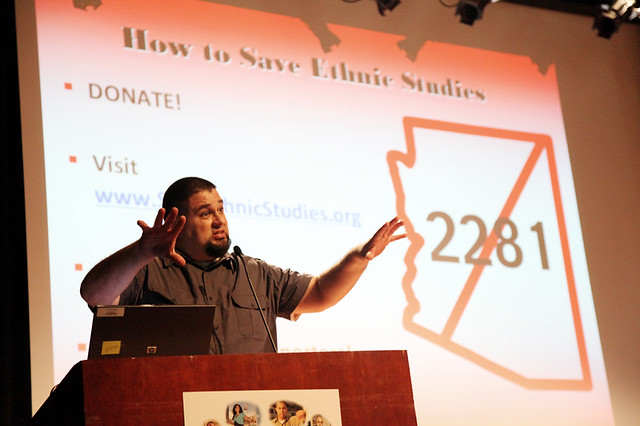
In response to a new Arizona House measure effectively banning the programs in its state’s public schools, representatives from the Tucson Unified School District sought solidarity with one of the nation’s pioneers of ethnic studies.
Representatives addressed the need to preserve ethnic studies programs in public schools nationwide to a large crowd assembled Tuesday in Jack Adams Hall. Arizona is currently under heavy scrutiny after its ban of ethnic studies programs went into effect with the passage of Arizona House Bill 2281 on Dec. 31.
“This show of support is critical for us,” said Augustine Romero, TUSD director of student equity. “Being here re-energizes us, as fighting can be tiring.”
The statewide bill prohibits any district or charter school to provide any courses that “are designed primarily for pupils of a particular ethnic group (or) advocate ethnic solidarity instead of the treatment of pupils as individuals.”
Despite orders from the state to discontinue their ethnic studies programs, the TUSD continued to offer such classes. As a result, they could face a reduction in funding.
“All of this is based on fear,” said Kim-Shree Maufs, commissioner for the San Francisco Board of Education. “The fear of not learning about ourselves, our heritage. History continues to be watered down when we don’t learn about ourselves.”
At the insistence of more than 125 advocates, the SFUSD unanimously passed a measure in February 2010 that allowed a pilot ethnic studies program to be continued and expanded throughout the district.
The TUSD and SFUSD are currently the only two districts in the nation to have district-supported ethnic studies programs, although Tucson lacks state support.
Sean Arce, director of Mexican American Studies for the TUSD, emphasized the need for the authentic education provided by ethnic studies that teaches students “respect, understanding, culturally and historically relevant material and emphasizes community cohesion.”
The speakers maintained that ethnic studies programs have resulted in higher graduation rates for participants and that they provided identity, purpose and hope to students who often fall through the cracks.
Currently, 48 percent of Latino high school students in Arizona drop out, the highest rate in the nation, according to Romero.
“Ninety-seven percent of all graduates within an ethnic studies program graduate high school and 70 percent go on to college,” Romero said. “We set an honor-standard curriculum and if what we have is relevant, they will do anything.”
Students enrolled in Arizona’s ethnic studies programs also had a higher chance of passing the state-mandated Instrument to Measure Standards Test, Romero said.
Although the presenters did not represent any institutions of higher learning, most in attendance acknowledged that ethnic studies programs in public schools greatly affect universities.
“It’s important for everyone to know that academic freedom is being questioned,” said Brigitte Davila, lecturer of Raza Studies.
Some in attendance feared for the future of SF State’s ethnic studies program, the first of its kind in the nation, as other CSUs have discontinued their programs, most notably of which being Asian American Studies at Cal State University, Los Angeles.
“This law certainly manifests the prerogative of whitewashing history,” said 23-year-old creative writing major David Alvarado. “This issue has been weighing on my mind, and it’s good to hear it being discussed.”



